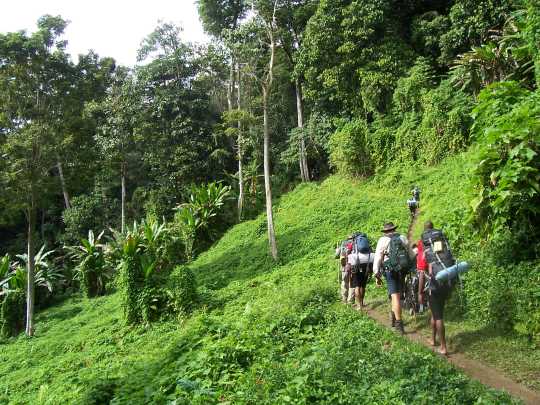Reading between the lines: putting life into perspective!

I’ve been off line for a while, spending time overseas, and in the past few days back in Australia I have been aware of various lines of people which have prompted me to return to the keyboard and share some of my own lines.
My wife and I just returned from our second trek of the Kokoda track. Trekkers walk in line, up, down, through incredibly rugged, strenuous and beautiful terrain. Walking with us were our porters, local men from one particular village, Kagi. While we wore hi-tech hiking boots to protect our soles from the twisty roots, rocks and pebbles, used light weight hiking sticks and carried purified water in special bladders in our backpacks, our porters were either barefoot or wore runners or thongs. A few had boots given to them by previous trekkers, but most wore old runners which had been taped together with black electrical tape. Some carried a plastic bottle which they filled from the numerous streams.
While we were resting from one of the numerous steep climbs, we met a group of families walking (walking!) to Port Moresby, a two days’ journey, to join in the recent 39th Independence Day celebrations. Most, if not all, were barefoot. Little children rode on their mums’ shoulders; babies were carried in slings or arms. Men and boys wielded machetes to help cut firewood or to clear the way when necessary.They easily made their way up the track at a pace which put us to shame. They smiled, said ‘hi’ and disappeared ahead of us. A few days later they would return home again by foot via the Kokoda Track.
Back in Port Moresby I watched the news for the first time in 10 days. The first thing I saw were lines of people who were certainly not celebrating anything. It was a line of refugees fleeing Syria and the threat of IS for the safety of Turkey. Like the Papua New Guinea families they, too, carried their children. They were not smiling, however. Rather than celebrating independence, they were fleeing their homes for safety in a foreign country. Who knows when or if they will ever return home. Who knows what is the fate of those left behind.
Then, on CNN, I saw the longest line. It was a line of mostly young adults stretching for ten city blocks in New York City. These people wore nice clothes and shoes. Some had been in this line for days, sleeping on the ground in warm sleeping bags. They were well fed, and sipping hot coffee, not from the fires like our porters made on the track but from the ubiquitous Starbucks cafés. They were not refugees seeking medical aid, food or clean water.
These were affluent New Yorkers waiting to buy the newest Apple iPhone. How eager they looked! They couldn’t wait to lay their hands on the world’s latest sleek, cool gadget. Their excited anticipation just stunned me. It’s only a phone, a device that will be outdated in a short time, after all.
I wonder if the iPhone purchasers could even imagine walking a fraction of the way with the people on the track. Were they at all concerned with the fate of the refugees streaming into Turkey? Did the refugees give the new iPhone a thought? Did the Papua New Guineans look at the lives of the New Yorkers or Syrians and long for what they had?
Did the Papua New Guinea families know or care about the new iPhone at all? (By the way, technology is used in Papua New Guinea, but not by and large along the track. The small villages we passed through are not connected to a power grid, nor to any other infrastructure. But some do use phone in Port Moresby and are on Facebook, too, including our local porters from the villages on the track.)
The New Yorkers looked like eager little children on Christmas Eve, waiting for their presents. But how long will it take until the shine wears off the phones? In fact, why is this even news?
On the track, we distributed school supplies and simple toys to the kids we met: crayons and colouring books; tennis balls, jump ropes, and spinning tops. The kids were so happy, happier than the New Yorkers and their new ‘toys’. They were certainly happier than the refugees.
What a world we live in. Three lines of people yet such different situations and lives. You don’t have to read between these lines to realise what a crazy world we live in!
Have you been in any eye opening situations before? What were they? What did they make you realise?









 Proudly Australian owned and operated
Proudly Australian owned and operated